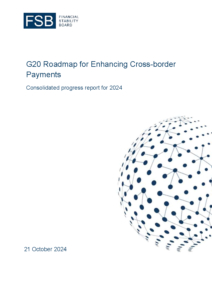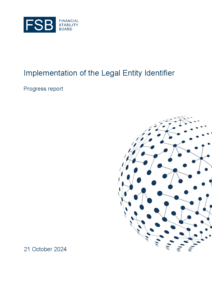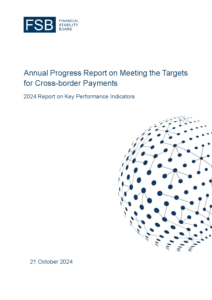Press enquiries:
+41 61 280 8477
press@fsb.org
Ref: 22/2024
- FSB publishes reports detailing work to enhance cross-border payments and welcomes the significant achievements of standard setters and international bodies in reducing obstacles to more effective cross border payments.
- At the global level, the FSB’s key performance indicators (KPIs) indicate that significant progress will be needed to improve the user experience across all payments market segments.
- In addition, some jurisdictions have made no tangible progress towards implementing the actions previously set out by the FSB to improve LEI adoption.
- The FSB calls for continued commitment and collaboration from multiple public and private sector organisations in order to achieve tangible results.
The Financial Stability Board (FSB) today published (i) a consolidated progress report for 2024 reporting on a broad range of actions being progressed as part of the G20 Roadmap for Enhancing Cross-Border Payments; (ii) a progress report on the implementation of the Legal Entity Identifier (LEI); and (iii) an annual progress report on meeting the improved user experience targets for cross-border payments.
Over the past year, global efforts to enhance cross-border payments, led by the FSB, in coordination with the Bank for International Settlements Committee on Payments and Market Infrastructures (CPMI) and relevant international organisations and standard-setting bodies, have continued apace. Strong progress was made in the G20 Roadmap’s planned actions. These include harmonisation of ISO 20022 data requirements and the extension of operating hours, as well as key reports on the use of application programming interfaces (APIs) and the interlinking of fast payment systems (FPS). Progress was also made in addressing frictions arising from requirements for managing payments data and access to becoming a payments services provider. Recommendations on these two topics will be issued in December 2024.
Adoption of the LEI has continued to grow at double-digit rates since 2019. While widespread LEI implementation has been reached in OTC derivatives and securities markets, adoption in cross-border payments remains a challenge. The costs, particularly in low-income jurisdictions, and the lack of perceived incentives for voluntary adoption by market participants and end users, among other things, are notable obstacles to the wider adoption of the LEI. Some jurisdictions have made no tangible progress towards implementing the FSB’s previously outlined actions. To maintain the momentum in expanding LEI adoption, particularly for cross-border payments, the FSB reiterates its 2022 recommendations and advocates for their full and timely implementation. The report includes additional recommendations for oversight authorities and standard-setting bodies to support this.
Nevertheless, while more than half of the planned actions set out by the G20 have been completed, the FSB’s key performance indicators which measure key aspects of the user experience in using payments services, suggest that further efforts are needed. The FSB emphasises the importance of intensified effort and commitment from a range of stakeholders, including by domestic regulatory/oversight authorities and payments services providers. The FSB, CPMI and other partner standard-setting and international organisations are strongly committed to achieving tangible results by completing the planned actions, and supporting implementation by payments services providers and oversight authorities.
Notes to editors
The G20 has made enhancing cross-border payments a priority to achieve faster, cheaper, more transparent and more inclusive cross-border payments, while maintaining their safety and security. In 2020, the FSB, in coordination with the CPMI and other international organisations and standard-setting bodies, developed a Roadmap to address these challenges. To provide accountability, in 2021, the G20 endorsed quantitative global targets related to the wholesale, retail and remittance market segments. In 2022, the FSB issued recommendations for improving the adoption of the Legal Entity Identifier (LEI) in cross-border payments to support G20 roadmap’s objectives.
To move the Roadmap forward and facilitate achieving the G20 targets in 2027, in February 2023, the FSB outlined specific actions that will be taken under three priority themes covering: payment system interoperability and extension; legal, regulatory and supervisory frameworks; and cross-border exchange and message standards.
The FSB coordinates at the international level the work of national financial authorities and international standard-setting bodies and develops and promotes the implementation of effective regulatory, supervisory, and other financial sector policies in the interest of financial stability. It brings together national authorities responsible for financial stability in 24 countries and jurisdictions, international financial institutions, sector-specific international groupings of regulators and supervisors, and committees of central bank experts. The FSB also conducts outreach with approximately 70 other jurisdictions through its six Regional Consultative Groups.


